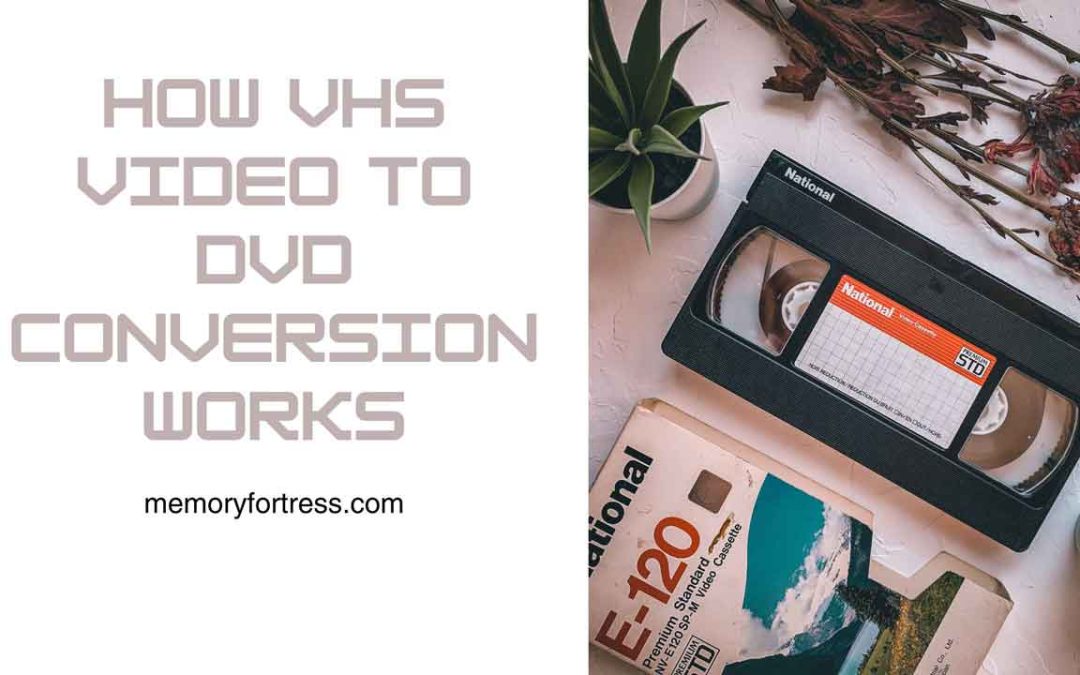What is VHS Video to DVD Conversion?
VHS video to DVD conversion transfers analog video content from VHS tapes to digital formats such as DVDs, thumb drives, or digital files.
This process involves digitizing the analog video signal from the VHS tape and converting it into a digital format that can be played on modern devices such as DVD players, computers, and smartphones.
VHS to DVD conversion is a popular service offered by companies like Memory Fortress, which helps customers preserve their precious memories stored on VHS tapes.
Want To Convert Old Home Movies To Digital Format? Contact Us!
The VHS Legacy and the Digital Revolution: A Journey from Analog Media
Remember the days of rewinding tapes and adjusting tracking?
The VHS (Video Home System) era was a golden age for home entertainment, but as technology marches forward, these beloved magnetic tapes are becoming relics of the past.
It is crucial to preserve analog media like VHS cassettes, which are prone to deterioration over time.
If you’re sitting on a treasure trove of family memories or rare recordings stored on VHS, it’s time to consider converting VHS to DVD or digital formats.
Converting your VHS memories to digital formats ensures that these cherished home videos are preserved and accessible for future generations.
In this comprehensive guide, we’ll explain everything you need to know about video VHS to DVD conversion, ensuring your precious memories stand the test of time.

Benefits of Converting VHS Tapes
Converting VHS tapes to digital formats offers several benefits. Firstly, it helps preserve the video content from degradation over time.
VHS tapes are prone to damage and have a limited lifespan, whereas digital formats are more durable and can last for decades.
Secondly, digital formats offer greater convenience and accessibility.
With a digital copy of your VHS tape, you can easily share it with family and friends, create highlight videos, and even upload it to social media platforms.
Thirdly, digital formats offer better video quality.
VHS tapes were limited to a 3:4 ratio NTSC video, whereas digital formats can offer high-definition video with better resolution and sound quality.
Finally, converting VHS tapes to digital formats helps to future-proof your memories.
As technology continues to evolve, digital formats will remain compatible with the latest devices, ensuring that your precious memories remain accessible for generations to come.
Types of VHS Tapes: Not All Tapes Are Created Equal
Before diving into the conversion process, it’s essential to understand the different types of VHS tapes you might encounter:
- Standard VHS: The most common format used in home VCRs.
- VHS-C: A compact version of VHS, often used in camcorders.
- Hi-8: An improved 8mm video format version offers better resolution.
- MiniDV: A digital tape format that provides high-quality video and audio.
Identifying your tape type is crucial, as it determines the equipment you’ll need for playback during conversion.
Storage Tips: Preserving Your VHS Tapes
Before you begin the VHS to digital conversion, ensuring your tapes are in the best possible condition is vital. Here are some storage tips to prevent further degradation:
- Store tapes vertically, like books on a shelf, to prevent warping.
- Keep tapes in a cool, dry place away from direct sunlight and magnetic fields.
- Use plastic cases to protect tapes from dust and physical damage.
- Rewind tapes before storage to reduce stress on the tape.
Proper storage can significantly extend the life of your VHS tapes, giving you more time to complete the conversion process.
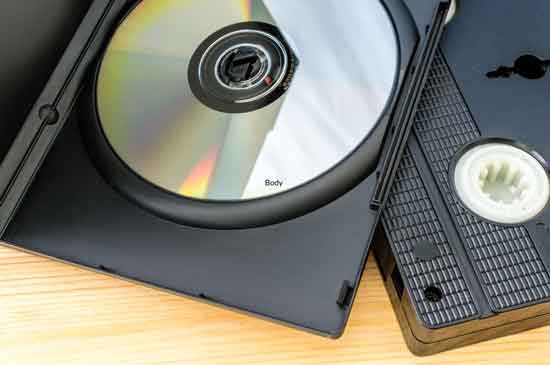
The Ticking Clock: Understanding VHS Tape Degradation
VHS tapes are not built to last forever.
Once the premier home video recording format, VHS tapes captured countless family memories.
Over time, the magnetic particles that store your precious memories begin to break down, leading to a loss of quality and, eventually, complete data loss.
This degradation process is accelerated by factors such as:
- Humidity and temperature fluctuations
- Exposure to magnetic fields
- Physical damage to the tape or casing
- Repeated playback, which causes wear and tear
On average, VHS tapes last 10-25 years, depending on storage conditions and usage. This limited lifespan underscores the urgency of converting VHS to DVD or digital formats to preserve memories indefinitely.
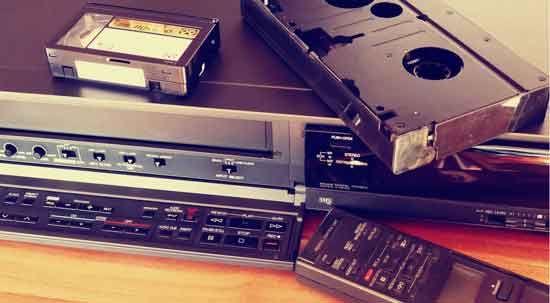
VHS To DVD Conversion Methods: Choose Your Path
Now that you understand the importance of converting your VHS tapes let’s explore the different methods available for VHS to digital conversion:
Video transfer services offer various options for converting VHS tapes to digital formats, catering to different customer needs.
Option #1: Using a Standalone DVD Recorder
This method is straightforward and doesn’t require a computer. Here’s how it works:
- Connect your VHS player to the DVD recorder using RCA cables (red, white, and yellow).
- Insert a blank DVD into the recorder and your VHS tape into the player.
- Start the recording process on the DVD recorder and play the VHS tape.
- Once finished, finalize the DVD according to the recorder’s instructions.
The DVDs produced can be played on various devices, including a DVD player.
Pros: Simple process, no computer required.
Cons: Limited editing options may require purchasing a DVD recorder.
Option #2: Using a VHS/DVD Combo Unit
Some devices combine a VHS player and DVD recorder in one unit, simplifying the conversion process:
- Insert your VHS tape and a blank DVD into the combo unit.
- Follow the device’s instructions to initiate the dubbing process.
- Wait for the conversion to complete and finalize the DVD.
Pros: All-in-one solution, easy to use.
Cons: It may be more expensive than other options, and there is limited availability of new units.
Option #3: Connecting a VCR to a PC via a Video Capture Device
This method offers the most flexibility and control over the conversion process:
- Connect your VHS player to a video capture device (USB or PCIe card).
- Install the necessary software on your computer.
- Capture the video from your VHS tape using the software.
- Edit the captured video if desired.
- Export the video to your preferred digital format or burn it to a DVD.
Customers can also choose to receive their digitized videos on a thumb drive for convenience and accessibility.
Pros: Offers editing capabilities and creates digital files for easy sharing and storage.
Cons: It requires some technical know-how and may require the purchase of additional hardware.
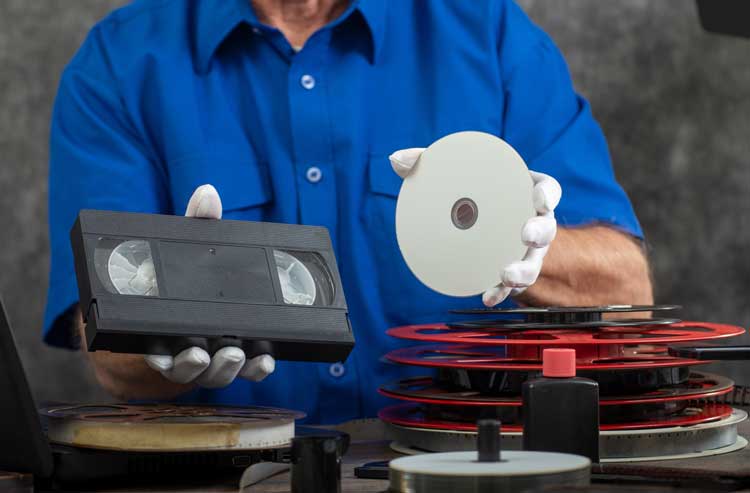
Storage and Backup: Securing Your Digital Memories
Once you’ve completed the VHS to digital conversion, it’s crucial to store your newly digitized videos properly.
Digital delivery through cloud services offers a convenient and safe way to preserve and access your digitized videos.
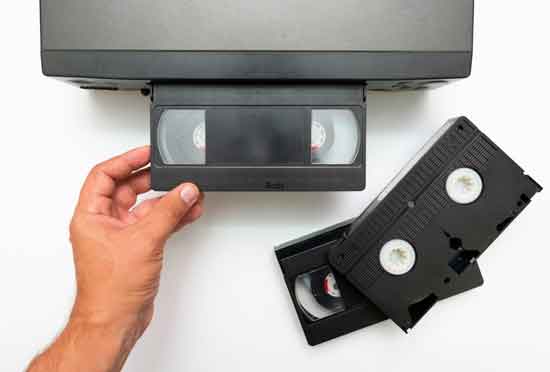
Digital File Formats
Common video formats for digitized VHS tapes include:
- MP4: Widely compatible and offers good compression.
- AVI: High quality but larger file sizes.
- MOV: Commonly used on Apple devices.
Cloud Storage Solutions
To ensure your digitized memories are safe from hardware failures or physical damage, consider using cloud storage services such as:
- Google Drive
- Dropbox
- iCloud
- Amazon Photos
These services offer secure, off-site storage for your precious memories, allowing you to access them from anywhere with an internet connection.
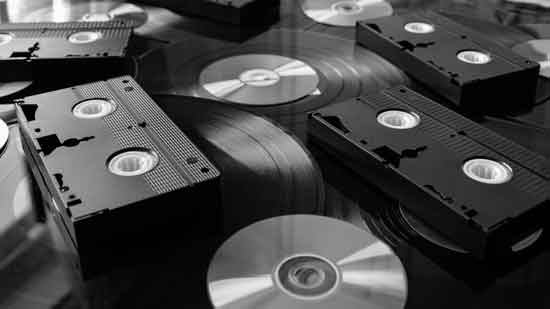
DIY vs. Professional Services: Making the Right Choice
You have two main options for VHS video conversion to DVD: do it yourself or use a professional service. Let’s weigh the pros and cons:
DIY Conversion
Pros:
- Cost-effective for small collections
- Complete control over the process
- It can be a fun project for tech enthusiasts
Cons:
- It is time-consuming, especially for large collections
- Requires investment in equipment
- Quality may vary based on your skills and equipment
Professional Services
Pros:
- High-quality results
- Time-saving, especially for large collections
- Access to professional-grade equipment
Cons:
- More expensive than DIY methods
- Need to trust your tapes to a third-party
- Less control over the process
When deciding between DIY and professional VHS to DVD conversion services, consider your budget, time constraints, and the value of your recordings.
Frequently Asked Questions
Conclusion: Preserving Your Memories for the Future
VHS video to DVD conversion is more than just a technical process; it’s about preserving your cherished memories and ensuring they’re accessible for future generations.
Whether you choose to embark on a DIY project or enlist the help of professionals, the important thing is to start the conversion process before it’s too late.
Remember, every day that passes puts your VHS tapes at risk of degradation.
Don’t let your precious memories fade away – take action today to convert your VHS tapes to DVD or digital formats.
Your future self (and your family) will thank you for preserving these irreplaceable moments in time.
Ready to start your VHS to digital conversion journey?
Whether you need equipment recommendations or professional conversion services, we’re here to help.
Contact us today to learn more about how we can assist you in preserving your video memories for the digital age.
Memory Fortress Team

Keith Osbon
Founder/President
Keith Osbon is the founder and President of Memory Fortress.
He has been passionate about preserving his family’s history and launched the company in 2015 to address the vital need that all Americans have.
Before Memory Fortress, Keith worked as a senior executive in digital analytics, starting in 2009.
A former Army captain, he began his post-military career in 1997 as a quantitative money manager for Goldman Sachs and JP Morgan.
Keith has a BA from Duke University and an MBA from the University of Georgia.

Dustin Williams
Office Administrator
Dustin Williams is the Office Administrator at Memory Fortress. He helps oversee the business’s daily operations, assures the high quality of our work, and maintains customer satisfaction.
At Memory Fortress, Dustin ensures that your family’s memories are handled with the same utmost care and consideration he would desire for his family memorabilia.
Dustin has over eight years of experience in customer service, including his time as a Front Desk Supervisor at Hyatt Regency Atlanta.

Lori Griggs
Creative Director
Lori Griggs is the Creative Director for Memory Fortress.
She has been with the company since its inception in 2015 and has focused on photo scanning and old documents.
Lori is an avid researcher; much of our initial equipment came from her recommendations and purchases.
In addition to her contributions to Memory Fortress, she is a talented painter.
She has a BFA from Georgia Southwestern University.
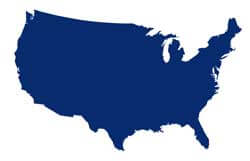
We Serve All Of The United States
It is our pleasure to serve all 50 States.
Our customers rely on us to deliver a top-quality, affordable product with a fast turnaround time.
When you need to convert 35mm film 8mm camcorder videos into the latest digital formats, USB or DVDs, we hope you will choose Memory Fortress.
Visit the order form here when you are ready. > Order Now!
Call us today to place your order: 678-675-0014
Send us a message below if you need additional information.
Nationally
Alabama Arizona Alaska Arkansas California Colorado Connecticut
Delaware Florida Georgia Hawaii Idaho Illinois Indiana
Iowa Kansas Kentucky Louisiana Maine Maryland Massachusetts
Michigan Minnesota Mississippi Missouri Montana Nebraska Nevada
New Hampshire New Jersey New Mexico New York North Carolina
North Dakota Ohio Oklahoma Oregon Pennsylvania Rhode Island

